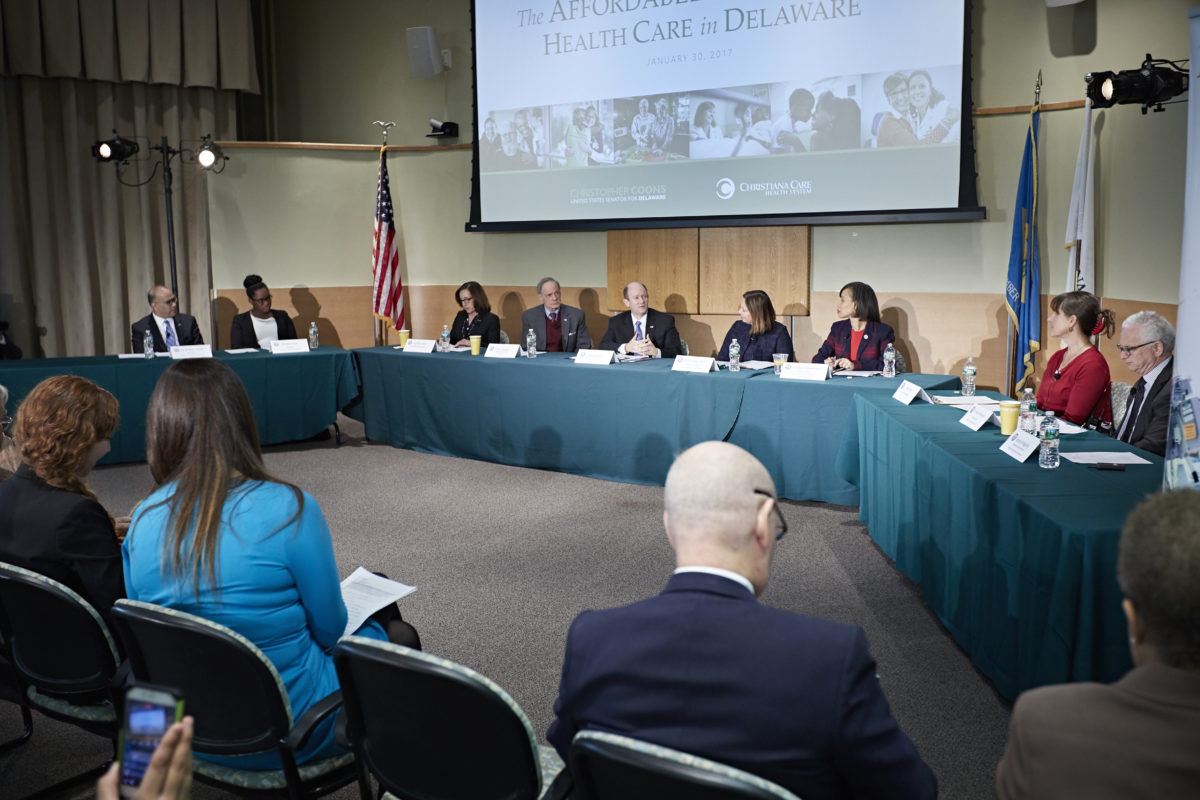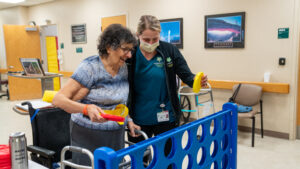Today in Delaware, a chronically ill senior with poor mobility can get comprehensive health care without leaving his living room, thanks to Christiana Care’s Independence at Home Demonstration Project.
A heart patient released from the hospital can get a reminder call from her care coordination team if she has forgotten to make a follow-up appointment with her cardiologist.
And through a $35 million grant from the Center for Medicare & Medicaid Innovation, the state of Delaware has been working to improve wellness among its citizens to make Delaware one of the nation’s five healthiest states.
All of these projects foster innovation, enhance the patient experience and improve the quality of care while reducing costs. And all are fruits of the Affordable Care Act, which was the topic of a panel discussion Jan. 30 at Christiana Care’s Wilmington Hospital. The discussion was held to review the success of the landmark legislation and talk about why the law’s progressive achievements need to be preserved.
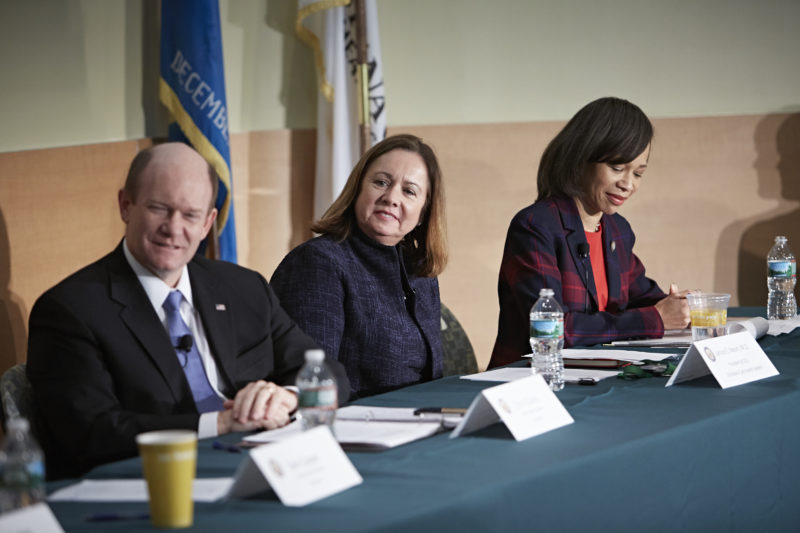
Christiana Care President and CEO Janice E. Nevin, M.D., MPH, partnered with U.S. Sen. Chris Coons in bringing together a health care panel to talk about the 2010 law because of concern over what might replace the Affordable Care Act in the 2017 Congress.
Numbers reveal part of the law’s success in Delaware. Before the Affordable Care Act, 101,000 people were uninsured in Delaware — 11.2 percent of the population. By 2015 the state had the ninth lowest uninsured rate in the nation, at 5.9 percent, or 54,000 residents, without coverage.
“We have had the great privilege at Christiana Care of seeing the impact of the Affordable Care Act firsthand,” said Dr. Nevin, who expressed an appreciation for what the law has accomplished in terms of innovations in health care delivery and better monitoring of chronic disorders such as diabetes and high blood pressure.
The panel discussion drew close to 80 health care stakeholders, including U.S. Sen. Tom Carper and U.S. Rep. Lisa Blunt Rochester, and at the state level of government, Sen. Bryan Townsend and Rep. David Bentz. With an 11-person panel, there were a variety of perspectives on the law’s achievements.
Stephen Groff, the state director of the Division of Medicaid and Medical Assistance, said that about 28,000 individuals annually have bought coverage through the Health Insurance Marketplace. On average, these individuals have received a $419 monthly tax credit.
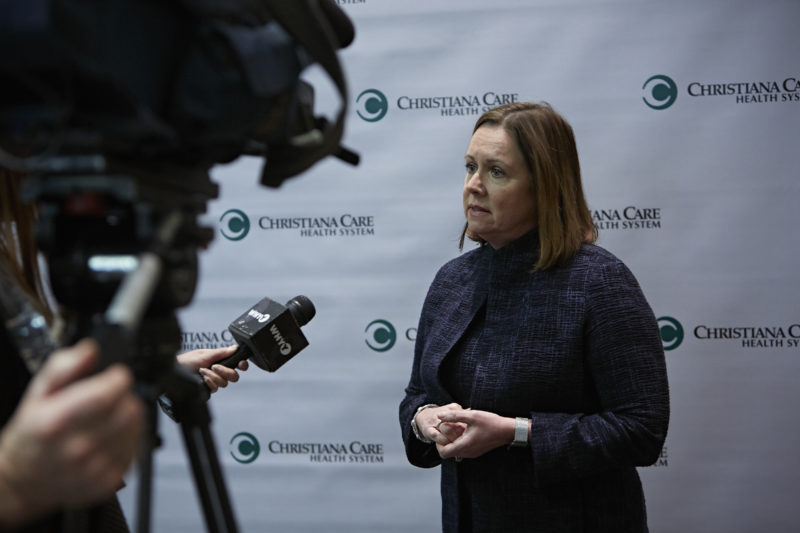
The most recent Medicaid expansion has provided 11,000 individuals with health insurance, which is in addition to more than 40,000 residents covered in an initial state Medicaid expansion. Furthermore, the repeal of the Affordable Care Act could result in the loss of $120 million in annual federal funding that comes to the state for enhanced health care delivery, said Groff.

“I think we should not miss that this legislation made it possible for more people to access health care, and for there to be enormous improvements to the entire health care system for all Delawareans,” said Sen. Coons.
Other panelists expressed anxiety about the prospect of losing gains made in health care delivery under the law. Kristen Issac, a marketplace guide, and Lolita Lopez, executive director of Westside Family Healthcare, explained how thousands of low-income residents have newly received health care at the nation’s 1,400 community health centers.
“Repeal of the law without adequate replacement would have a devastating impact on under-served communities,” said Lopez.
Roy Proujansky, M.D., executive vice president and CEO, Nemours Delaware Valley Operations, said any abrupt changes in the law would be bad for pediatric patients who thrive with a consistency in care.
Prayus Tailor, M.D., president of the Medical Society of Delaware and program director for Christiana Care’s Nephrology Fellowship Program, said physicians affiliated with the Medical Society of Delaware have drafted key objectives for health care, if American medicine is to retain the achievements made under the Affordable Care Act. Overall objectives include assuring that individuals now covered do not become uninsured and maintaining key insurance market reforms, such as coverage for pre-existing conditions and coverage for young adults on their parent’s policies.
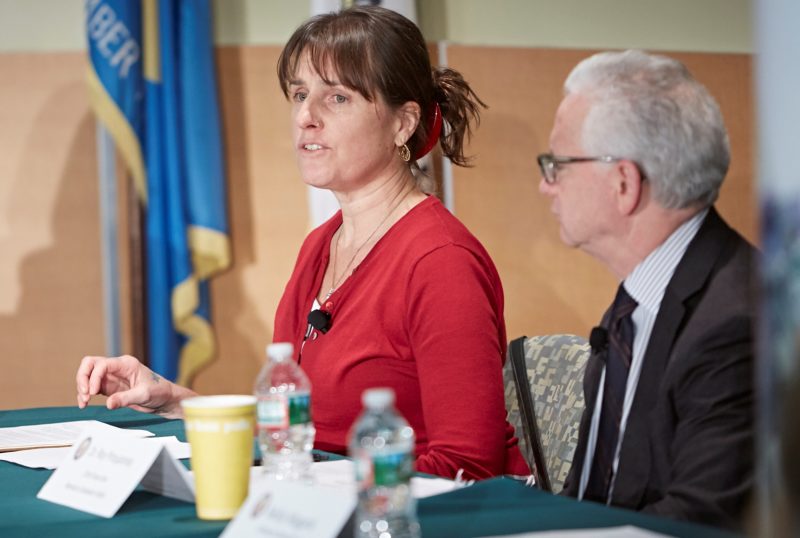
Perhaps the most memorable comments from the day came from Christiana Care patient Kerry Orr, who spoke movingly about how the Affordable Care Act saved her life. A single, self-employed therapist and yoga teacher who lives in the Wilmington area, Orr spoke of choosing a lifestyle that offered creativity and freedom, as well a chance to make a difference in the lives of others by helping them achieve a sense of wellness. Her commitment to this work suited her but did not provide large financial rewards, such as a paid vacation or sufficient income to purchase health insurance.
When the health insurance law was enacted, she was skeptical that it would provide any real assistance to her. In any case, she continued to eat well and exercise to stay healthy. Because of the individual mandate, she bought health insurance for the first time in May 2014 with the help of a subsidy.
The following year, her primary care doctor suggested a colonoscopy in response to symptoms she was reporting, and at age 47, the screening found a massive tumor.
Her friends and family were shocked and worried at learning she had Stage 3 cancer. But she felt a bit differently.
“I was so relieved I had health insurance that my gratitude outweighed my fear,” said Orr. “I felt so fortunate.”
Orr praised the surgery and follow-up chemotherapy she received at Christiana Care and the Helen F. Graham Cancer Center & Research Institute.
“The Affordable Care Act literally saved my life,” she said. Without the individual mandate she would not have bought a policy, and without a subsidy she could never have afforded insurance. “And without coverage for a preventive colonoscopy I would have been dead,” she said.
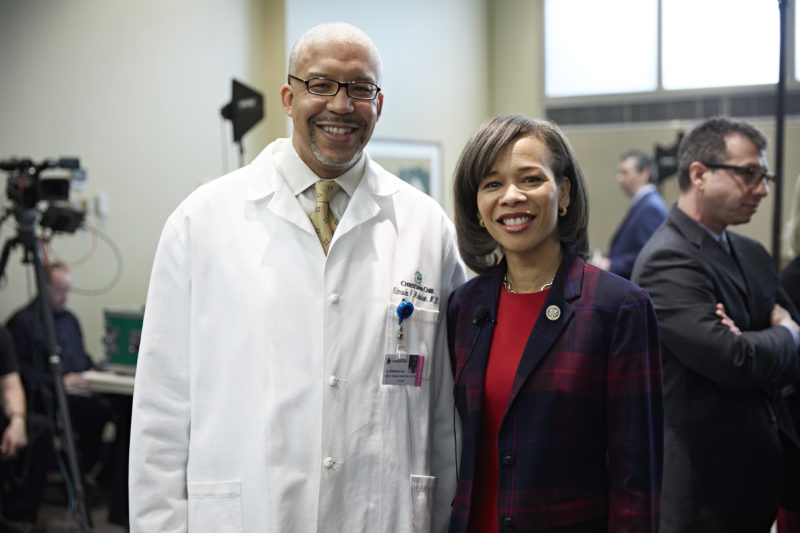
The Affordable Care Act has not just been a boon for patients, but has funded many new innovative programs, transforming the way that Christiana Care delivers health care, said Dr. Nevin. For instance, Christiana Care was one of 16 health care providers nationwide originally selected to participate in a forward-thinking home-care program for chronically ill seniors.
Called the Independence at Home Demonstration Project, this Centers for Medicare and Medicaid Services program, created through legislation co-authored by Sen. Carper within the Affordable Care Act, tests whether delivering primary care services in the home can lead to better health outcomes and reduce costs for patients living with multiple chronic illnesses.
Christiana Care’s nationally renowned care-management program known as CareVio was birthed through the “Bridging the Divides” project, which was funded through $10 million from the Center for Medicare and Medicaid Innovation. The program includes a comprehensive care team that responds quickly and effectively to patients, enabling them to recuperate in their homes and manage their symptoms to avoid unnecessary hospital readmissions.
To support the new care model, Christiana Care designed an electronic patient portal and personal health record that enables individuals to communicate directly with their care-management team.
In 2011 Christiana Care created the Value Institute to conduct real-world research on pressing Delaware health care needs. Members of the Value Institute have a wide-range of expertise — in medicine, public health, law, business, economics, statistics and informatics — and collaborate in the discovery of solutions that improve the experience, efficiency and effectiveness of health care for patients and providers alike.
Will such sweeping medical improvements continue if the Affordable Care Act is repealed and not replaced? That was a question panelists addressed throughout the morning, but regardless of what happens with law, Christiana Care is committed to creating innovative, effective and affordable systems of care that Delawareans value, said Dr. Nevin.
“I am an optimist,” she said. “I often say that the bigger the challenge, the bigger the opportunity. To turn our challenges into opportunities, we will partner with our leaders in Washington, leaders in our state and with all of you so that we can continue to advance quality health care. At Christiana Care, we have been an integral part of this community for 100 years, and we will be here for 100 more.”
